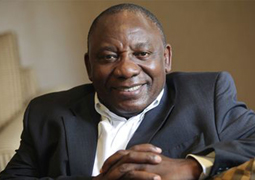
Yesterday Parliament hosted the official opening of the National House of Traditional Leaders (NHTL) which was addressed by the President of the Republic of South Africa, President Cyril Ramaphosa.
The ceremony, which was attended by Parliament’s Presiding Officers: the Speaker of the National Assembly Ms Baleka Mbete, and the Chairperson of the National Council of Provinces Ms Thandi Modise and other Members of Parliament, was presided over by the Chairperson of the National House of Traditional Leaders, Ikosi Sipho Mahlangu.
President Ramaphosa used his address to advocate for the economic upliftment of rural areas and called on the traditional leaders to work together with government and the private sector to ensure economic growth and the development of rural areas.
He said there was commitment from all government departments to work with traditional leaders for social and economic development of rural areas. “We are working with several investors, both local and international, to identify and explore opportunities in rural areas. I am sure that you are aware that rural economic development features prominently in the economic stimulus and recovery plan which we announced in September last year,” President Ramaphosa said.
He said while investment was often drawn towards the more developed urban centres, there was great unrealised potential in rural areas. He said there are measures in place to unleash an agricultural revolution in South Africa, and the epicentre of this revolution will be in the rural areas.
“Among the areas where we want to see greater focus is on investment in the rural economy, particularly in agriculture and agro-processing, mining, tourism and infrastructure. We are committed to work with traditional leaders to significantly expand the amount of arable land available for agricultural production, both for food security and to create job opportunities,” emphasised President Ramaphosa.
He added that one of the industries which had great potential to uplift the standard of living of people in rural areas is mining, which he said had done great harm to rural areas, since early mining days in South Africa. President Ramaphosa said the need for cheap labour on the mines hastened the dispossession of the land of the African people and reduced many traditional areas to resevoirs of labour.
“Mines also caused much social and environmental damage in the areas they were located, and while much has changed since the advent of democracy, there is still much to do to ensure that mining brings real and lasting benefits to rural communities. Traditional leaders are well-placed to ensure that the new Mining Charter is effectively implemented in their respective areas,” said President Ramaphosa.
He said government was committed to work closely with traditional leaders to ensure that mining does no damage the environment, and must contribute more directly to social and economic development of rural communities.
“Issues around mining licences, environmental impact assessments, water use licences, surface lease agreements, social and labour plans and transformation must be enforced for the benefit of the communities in which mining operations take place” said President Ramaphosa.
President Ramaphosa also paid tribute to the institution of traditional leadership for its role and responsibilities in a democratic system. “The institution of traditional leadership in South Africa stretches back into antiquity, representing an unbreakable bond between our people’s past and their present. It is a living reminder of who we are and where we come from, of the traditions that sustain us and the values that guide us,” he stressed.
Traditional leadership, however, he added, not only represents a link to our past; it is also an essential part of our future.
He also encouraged the traditional leaders to help in the fight against corruption, especially in local government where they also operate. Not only must traditional authorities themselves be above reproach, but they have an important role to play in ensuring that local government structures, in particular, are free from corruption and patronage.
“As we step up the fight against corruption, as we restore the integrity of our institutions, it is essential that we restore the moral fabric of our society. We look to traditional leaders to be at the forefront of the effort to inculcate a sense of moral responsibility, social cohesion and accountability across society,” President Ramaphosa said.
He told the traditional leaders that his government welcomed the progress that has been made in Parliament with the passage of the Traditional and Khoi-San Leadership Bill, which he said has been placed on the Order Paper of the National Assembly. “This is a historic piece of legislation, which will, for the first time, give statutory recognition to the Khoi-San,” said President Ramaphosa.
Furthermore, President Ramaphosa said this is a development that is long overdue and is an essential step in restoring the dignity – and recognising the traditions and cultures of one of South Africa’s indigenous groups.
President Ramaphosa urged traditional leaders to step up the fight against the death of initiates at initiation schools during initiation seasons. He said the death even of one initiate at initiation schools is unacceptable as the tradition existed for building and delivery of responsible men who would be family and community leaders.
President Ramaphosa’s annual address to the NHTL leaders will be debated in another formal sitting of the House on Thursday (21 February) here at Parliament.
By Sakhile Mokoena
20 February 2019

